Iranian Wushu Team Excluded from World Championships as US Denies Visas

The Iranian national team faces exclusion from the World Wushu Championships due to the United States' failure to issue visas.

The Iranian national team faces exclusion from the World Wushu Championships due to the United States' failure to issue visas.
Amir Sadeghi, the head of the Wushu Federation, expressed deep disappointment, stating, "Unfortunately, the visa request for the entire Iranian delegation was left unanswered." The Iranian team was poised to compete in the World Championship scheduled in Texas, USA, from November 15.
Sadeghi emphasized the contradiction to the spirit of sportsmanship, saying, "Once again, contrary to the principles of fair play, the US did not issue visas in a timely manner for the Iranian national team."
Highlighting Iran's proactive approach, Sadeghi mentioned, "According to the organizing committee, Iran was the first country to initiate the visa issuance process. We started the necessary procedures in April, presented ourselves at the US Embassy in Yerevan, Armenia, in mid-May – an unusual four months before the competition – for interviews and document submission."
In July, The US State Department also refused the visas for the latest round of the Volleyball Nations League in California, while a long list of officials accompanying the team in the US were granted the visas. The visit sparked controversy in Tehran, where the Iranian public are funding bureaucrats' travel at the expense of key athletes.

Speculations about US planning to release another multibillion-dollar chunk of Iran’s funds frozen in Iraq has worried American lawmakers and the international community.
The Washington Free Beacon reported Monday that the Biden administration is set to approve a sanctions waiver that will allow Iran to access at least $10 billion in previously frozen funds held in Iraq. The acutely contested decision comes just a month after the Tehran-backed Islamist group Hamas launched an attack on Israel that left 1,400 mostly civilians dead.
The waiver -- which would extend the sanctions relief first issued in July and set to expire Tuesday, November 14 -- allows Iraq to transfer frozen electricity payments into Iranian-owned bank accounts in Europe and Oman.
In July, the Biden Administration announced that some of Iran’s frozen funds in Iraq will go to Oman, acting as a conduit to release the money for purchasing non-sanctionable goods under US supervision. Iraq owes Iran around $11 billion for imports of gas and electricity, but US banking sanctions prohibit dollar transactions with Iran. In June, the US agreed to make $2.7 billion available for Iran’s humanitarian needs.
The Trump administration first allowed Iraq to import electricity and gas from Iran, but only on the condition that the payments were kept in an escrow account in Baghdad. The Biden administration continued to issue that waiver, and then broadened it in July so that Iraq could move more than $10 billion outside the country, enabling Tehran to draw on the funds for its budget and humanitarian needs. In late October, the governor of the Central Bank of Iran reportedly discussed expediting Iran's access to the funds with his Omani counterpart.
In September, Washington released about $6 billion of Tehran’s frozen funds in South Korea as well as five Iranians from US prisons in exchange for five Iranian-Americans held hostage in Iran. The US-Iran agreement led to criticism of the Biden administration, as many called the scheme the largest ransom payment in history.
In October, Hamas waged its bloody war against Israel. The Iraqi waiver renewal has sparked concerns that such financial support could indirectly aid Iran's proxies. The Biden administration insists that, like the $6 billion held in Qatar, Iran can only use the $10 billion for non-sanctioned purposes. However, critics argue that since money is fungible, the access allows Iran to free up cash in other places for illicit activities.
In a US State Department briefing on Monday, spokesman Matt Miller declined to comment on the reports, saying he would not talk about “social media speculations.”
The news has prompted reactions by US lawmakers who were already pushing for tighter enforcement of sanctions on Tehran. Republican lawmakers in Congress argue that even though the money was allocated for humanitarian purposes, it helps the Islamic Republic regime divert funds into US-designated terror groups like Hamas and Hezbollah. They made this argument when they pressured the Biden administration to halt its $6 billion ransom payment to Iran.
Worried over the decision, Senator Bill Hagerty (R-TN) renewed his call on Congress Tuesday to pass his proposed Iran Sanctions Relief Review Act (S.2210), supported by 41 senators. The bill can mandate a congressional review of actions to terminate or waive sanctions imposed with respect to Iran. Representative Jim Banks (R-IN) also urged a similar motion at the House, where over 100 Republican lawmakers cosponsored the Maximum Pressure Act to codify the Trump administration’s maximum pressure campaign on Iran into law.
"The world is living in a post-October 7 world, but the White House is still running an October 6 policy toward Iran," Richard Goldberg, a senior adviser at the Foundation for Defense of Democracies and sanctions expert who previously served on the White House National Security Council, told the Washington Free Beacon.
"Why should Iran have any access to more than $10 billion after sponsoring one of the worst terrorist attacks against American citizens and the worst massacre of Jews since the Holocaust? It would make more sense to freeze all of these accounts and keep every penny out of Tehran's hands."
In testimony before Congress late last month, Goldberg advised Congress to lock down the $10 billion as punishment for Tehran’s role in supporting Hamas’s war on Israel. He said Tuesday that the decision to release Iran’s money in Iraq is a “massive sanctions relief for Iran. It is NOT like previous waivers. It is NOT what the Trump administration did.”
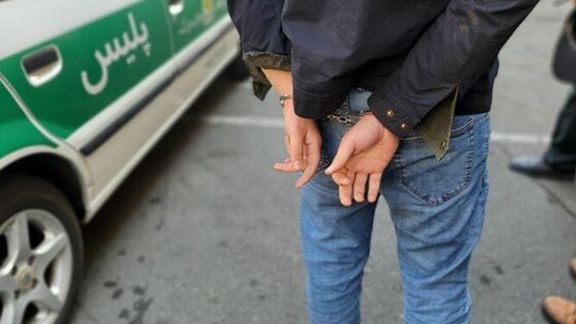
Iranian police have arrested 300 people who attended a mixed-gender party in a wedding venue as the regime cracks down further on gender segregation.
The deputy police chief of Semnan province, Ali Mirahmadi, said the arrest happened while the officers on patrol noticed an “unrestrained night party” in a hall located on the outskirts of Shahrood city.
Iran’s Sharia law forbids men and women who are not related from mingling together, and it is forbidden to dance with the opposite gender. Also, both sexes are prohibited from having out-of-wedlock relations. Mirahmadi added that the venue had been sealed due to trade violations.
There has been an increase in the number of reports about young people being detained for participating in "mixed parties" and "refusal to wear hijab" across Iran as morality police step up actions across the board.
Authorities have increased their surveillance of businesses and recreational venues, closing down cafes, restaurants and halls across the country for not complying with the government's mandatory hijab law. .
The hijab law has raised anger since the death in custody of Mahsa Amini in September 2022, arrested for not wearing her headscarf properly. Following the incident, a nationwide uprising was sparked, and demands went beyond the hijab and included protests over the regime's corruption, mismanagement, and oppression.
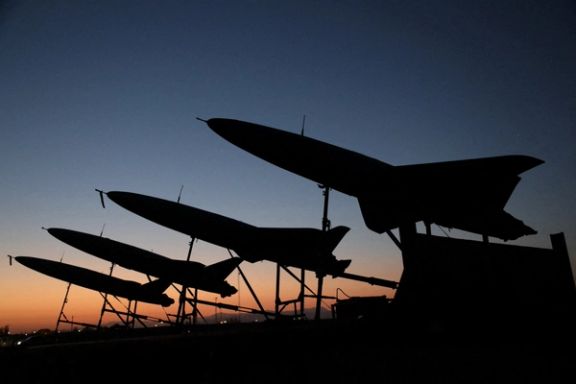
Satellite imagery shows progress in the construction in Russia of a plant that will mass produce Iranian-designed kamikaze drones, a research organization said on Monday.
Despite the headway, neither the United States nor its allies have imposed sanctions on the plant's owner, JSC Alabuga, or its associated companies, the Institute for Science and International Security said in a report report.
Iran began supplying hundreds of kamikaze drones to Russia in mid-2022 that have been extensively used against civilian targets in Ukraine.
The report said a mid-September satellite image showed that new construction at the plant "directly" correlated with a leaked building floor plan that the Washington Post shared with the institute earlier this year.
The building, according to other leaked documents, will be used for the mass production of Iran's Shahed-136 that will include improving Iranian fabrication processes "and ultimately advancing the drone's capabilities," the report said.
"With winter fast approaching ... Russia can be expected to accelerate its Shahed-136 attacks against Ukraine's vital energy infrastructure, causing brutal living conditions for the civilian population," the report said.
"A key overdue step" is for Washington to sanction Alabuga and its associated companies, the report continued. The United States and its NATO allies have already imposed sanctions on individuals and entities engaged in supplying Iranian drones to Russia.
Ukrainian President Volodymyr Zelenskiy on Sunday warned his country to prepare for Russian strikes on energy infrastructure. Last winter, Russia unleashed waves of such attacks, prompting rolling blackouts.
The plant is located 500 miles (800 km) east of Moscow in the Tartarstan Republic.
The White House in June said Russia and Iran appeared to be deepening their defense cooperation and that in addition to supplying drones, Tehran was working with Moscow to produce Iranian drones in Alabuga.
With reporting by Reuters
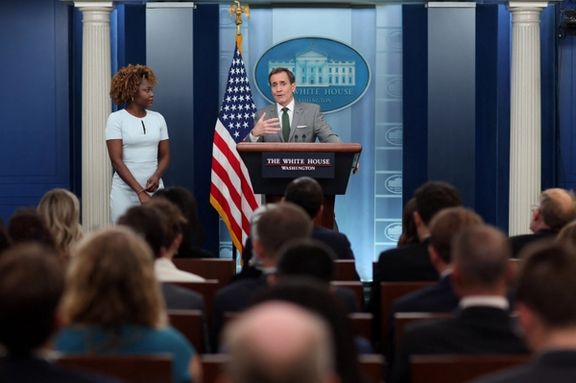
US National Security spokesman John Kirby emphasized on Monday that the United States is not seeking a conflict with Iran in spite of an ongoing shadow war with its proxies in the region.
In an interview with Fox News, Kirby stated that in spite of over 40 attacks being carried out on US facilities in Iraq and Syria since the war in Gaza broke out, "We don't seek a conflict with Iran right now".
The US was fast to defend Israel's right to defend itself after the Hamas invasion on October 7, which saw 1,400 mostly civilians killed and around 240 taken hostage to Gaza. The US has vowed to support Israel militarily and since deployed two carriers and thousands of forces to the Middle East as Iran's proxies began to step up action not only against Israel but against US targets.
Kirby mentioned retaliatory strikes, of which so far there have only been three, aimed at deterring further attacks on US military bases in the region. He emphasized that the focus is on inhibiting the capacity of Iran's Islamic Revolutionary Guard Corps (IRGC) to support their proxy groups.
Responding to questions about why President Joe Biden hasn't ordered a direct attack on Iran's key military infrastructure, Kirby stated that the government is currently focused only on targets that hinder the IRGC's support for proxy groups.
When asked about potential actions and whether Biden is waiting for American casualties before taking substantive action, Kirby emphasized the readiness to take retaliatory strikes to protect troops and facilities. He concluded, "We are not looking to escalate, but if they continue to attack our troops and put their lives in danger, we will continue to take action to protect them."
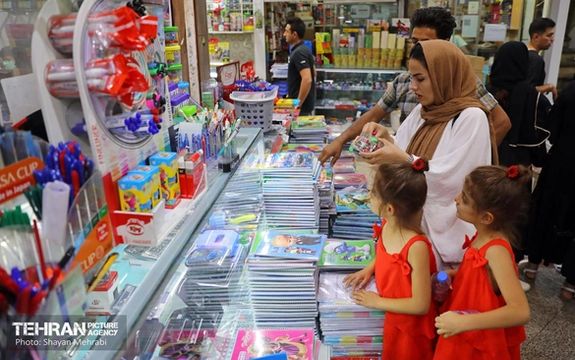
Iran’s fast-declining population growth rate has not improved despite massive budget allocations to a regeneration scheme, a prominent commentator has pointed out.
“The current administration and parliament have spent a minimum of 250 trillion rials ($500m) a year to increase the birth rate, but 25,000 fewer babies have been born each year. [Consequently], every fewer birth has cost 10b rials ($2,000)!!,” Abbas Abdi wrote in a commentary in the reformist Etemad newspaper Tuesday.
Abdi who sarcastically called this one of President Ebrahim Raisi’s “biggest achievements,” said budget allocated to encouraging population growth in the current year, not including sums allocated for the same purpose indirectly, was higher than the country’s development budget in the previous year.
He also pointed out that to cover up its failure, the government delayed releasing birth figures for over six months and then officials only disseminated piecemeal information that nevertheless indicated continuing decline.
Officials’ most recent statements indicate that the population growth rate has dropped to 0.6 percent from 1.23 two years ago which was also much lower than the 4.21 percent in 1984, five years after the Islamic Revolution of 1979. This is why the annual decline in births that Abdi has highlighted becomes more meaningful, since 25,000 fewer babies follows a decades-long trend.
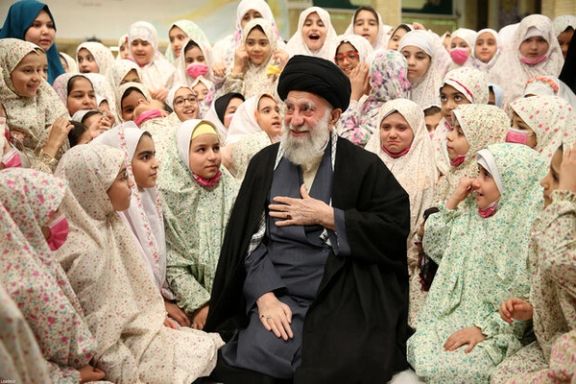
The country’s population has doubled from around 40 million in the early 1980s to 84 million now, but Supreme Leader Ali Khamenei always insists that increasing Iran's population is one of the most urgent duties of the government.
Since 2014, Khamenei has repeatedly said that Iran’s population should rise to at least 150 million by 2050 to avoid having an elderly population.
Responding to Khamenei’s calls, the parliament, dominated by hardliners, passed a law in March 2021 promoting population growth. The law compels government and state entities to encourage marriage and childbearing, enforces penalties for non-compliance, and prohibits any activity promoting birth control. It also bans government health services from providing family planning services, such as contraceptives, vasectomies, and tubectomies. The law, branded as Supporting Family and Regenerating Population Act includes incentives like increased child-benefit payments, interest-free loans, and free land allocations for families with more than three children.
Parliament also passed a measure scrapping routine pre-natal screening for genetic diseases or disability by government health centers but did not impose a ban. In August, however, the health ministry’s food and drug administration announced that it would no longer issue permits for production or imports of screening kits for congenital and chromosomal anomalies including Down Syndrome.
Government family planning programs – including free contraceptives and vasectomies at governmental healthcare facilities opened in the 1980s – were gradually abandoned over the past ten years, even before the approval of the new restriction, with those defending family planning dubbed enemy "infiltrators."
Critics of a population increase policy say that the Islamic Republic has not been able to boost the living standards, with more than 35 percent considered to be living under the absolute poverty line according to official statistics and many more living in increasing hardship despite having multiple jobs. Some academic studies have linked the drop in the fertility rate to the growth in women’s access to education.
Both Iran's Shiite religious establishment and political hardliners have long expressed concerns not only over an ageing population but also a decline of the Shiite population in comparison with Sunni Muslims, who constitute around ten percent of the country’s population.
In April 2014 Ayatollah Jafar Sobhani, a prominent Shiite sources of emulation in the city of Qom, warned that the Saudis were plotting to obliterate the "absolute majority of Shiites in all Iranian cities."